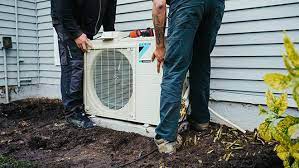Searching for a reliable and eco-helpful strategy to heat and cool your home or building? Then you might like to consider setting up a heat pump program. Heat pumps are becoming popular because of their outstanding performance, energy effectiveness, and flexibility. Nonetheless, most people are still not aware of how heat pumps work, what kinds can be purchased, and the way to select the right a single for their needs. In this ultimate information, we’ll delve into the industry of heat pumps and respond to all of your inquiries.
What exactly is a heat pump?
A heat pumps (tepelné čerpadlá) is actually a heating and cooling system that techniques heat in one place to one more. Contrary to traditional furnaces and air conditioning units that create heat or amazing oxygen, a heat pump transfers heat through the outdoor air flow or ground towards the inside space, or vice versa. This method can be done thanks to the refrigerant that circulates in between the indoor and outdoor units of the heat pump. By taking in heat from the air flow or ground and issuing it in the house, a heat pump can offer successful heating and air conditioning throughout every season.
What forms of heat pumps are there any?
There are several varieties of heat pumps that vary in how they draw out and provide heat. The most typical varieties are air-resource, terrain-supply, and hybrid heat pumps. Oxygen-provider heat pumps attract heat from the exterior air flow and spread it in the house making use of air flow ducts or possibly a ductless system. Floor-provider heat pumps, often known as geothermal heat pumps, extract heat from your floor or water employing a loop of pipes hidden subterranean and carry it to the inside unit. Crossbreed heat pumps merge the benefits of oxygen-provider and terrain-resource heat pumps by utilizing them interchangeably, according to the outside temperatures as well as prices.
How effective are heat pumps?
Heat pumps are highly productive heating and chilling methods that could help you save money on electricity expenses and minimize your carbon footprint. The productivity of the heat pump is calculated by its periodic power effectiveness proportion (SEER) for cooling down and heating in season overall performance component (HSPF), which stand for the quantity of heating or cooling down result per model of vitality consumed. Generally, a greater SEER and HSPF score indicates a more productive heat pump. Compared to standard furnaces and ac units, heat pumps offers up to 300% much more vitality performance, meaning they can generate thrice far more heat than the electricity they take in.
How do I choose the best heat pump for my requirements?
Selecting the best heat pump for your house or building depends on numerous factors, for example the weather conditions, the shape and layout of the place, your finances, and your choices. To look for the appropriate scale of the heat pump, you must execute a heat stress working out that thinks about the level of heat damage or grow in every single place in the constructing. You also need to decide on the particular heat pump that fits your needs and price range, along with any additional capabilities, like zoning, oxygen filtration, or intelligent controls. Talking to a professional heat pump specialist may help you navigate through your options to make a knowledgeable selection.
Do you know the benefits of using a heat pump?
Utilizing a heat pump for your main heating and cooling system can bring several positive aspects for you and the atmosphere. As we talked about previous, heat pumps are highly cost effective, which means they can lessen your energy expenses, particularly if you are now living in a average weather conditions. Heat pumps also create a lot fewer green house gasoline emissions than standard heating and air conditioning methods, that can help mitigate climate change. In addition, heat pumps can increase indoors air quality by filtering out plant pollen, dirt, and also other particles, and give adaptable heat control for each place.
quick:
We hope that it guide has shed lighting on the realm of heat pumps and given you tips on how to include them into the residence or developing. Whether or not you would like an expense-powerful and environmentally friendly method to heat or cool your home, or perhaps interested in the most recent power-protecting technologies, a heat pump is surely an exceptional solution. By learning how heat pumps work, what sorts can be purchased, and ways to choose the best one to meet your needs, you could make an informed determination and enjoy the benefits of effective and eco-friendly heating and cooling down.



